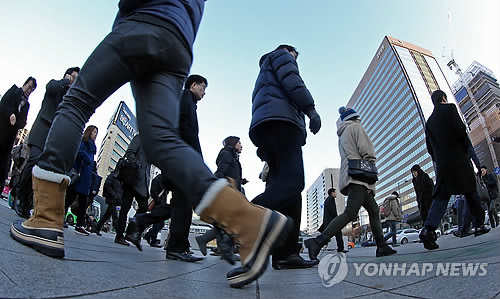The government is considering measures aimed at easing “inflexibility” in employment at large businesses and public companies as part of its structural reform, a key policy objective to be included in its economy management plan for next year, government sources said Tuesday.
It is hoped the measures will make it easier for companies to adjust salaries and working hours for regular workers. An extension of the current two-year contract period for irregular workers to three years will also be included, according to the sources.
“To reduce the impact on the overall labor market, we are exploring ways to expand flexibility in companies known for their strong inflexibility in employment,” a high-ranking government official said on condition of anonymity.
 |
(Yonhap) |
An expansion of performance-based bonuses and a wage peak system could be among the ways under discussion, he said. The government is seeking to apply them first to large companies and public enterprises where labor inflexibility is high due to the relatively powerful labor unions.
The government is to unveil details when it announces its economy management plan for 2015 later this month.
The move comes after Finance Minister Choi Kyung-hwan recently made controversial remarks, saying that the country needs structural reform in its labor market where regular workers are being “overprotected.” He said that this causes companies to shun recruitment and instead rely on irregular workers who they can fire more easily.
His comments raised some eyebrows on suspicion that the government is demanding sacrifices from regular workers, not trying to deal with root causes. Some critics said that his comments are equal to attempting to lower the overall level of protection for workers in the name of helping irregular workers.
Choi later confirmed that the labor market reform will not be focused on making it easier to fire employees but making it easier for companies to adjust wage and working schedules.
The latest government data showed that the number of irregular workers in Korea came to 6.08 million as of August, about 32.4 percent of the country’s total salaried workers. This is the first time that irregular workers have exceeded 6 million since related data started to be compiled in 2002. (Yonhap)





![[Exclusive] Hyundai Mobis eyes closer ties with BYD](http://res.heraldm.com/phpwas/restmb_idxmake.php?idx=644&simg=/content/image/2024/11/25/20241125050044_0.jpg)
![[Herald Review] 'Gangnam B-Side' combines social realism with masterful suspense, performance](http://res.heraldm.com/phpwas/restmb_idxmake.php?idx=644&simg=/content/image/2024/11/25/20241125050072_0.jpg)

